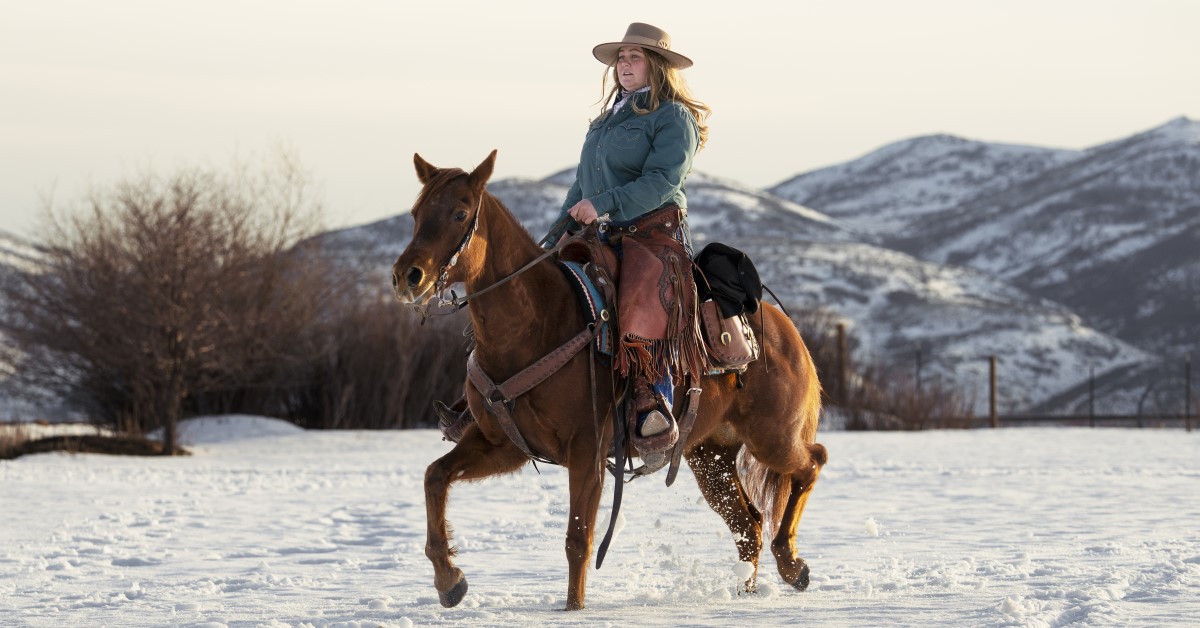Seasonal Horse Care: Adapting to Winter Weather
As your horse’s needs shift with the season, learn how to help them adapt to changing weather conditions.

Horses are resilient creatures, capable of tolerating temperatures as low as 40 degrees below zero with adequate shelter. Their unique biological advantages, such as their thick winter coat, help them adapt well to seasonal weather changes. Horses also possess a powerful digestive system that transforms fibrous materials like hay into heat that keeps the body warm, even in extreme cold.
Despite being particularly hardy animals, horses fare best when they receive the proper care during weather changes. Let’s review some seasonal horse care tips and learn why it’s important to prepare your horse for fall, winter, and beyond.
Reevaluate Your Horse’s Nutritional Needs
Your horse may require additional nutrients in the winter when grass quality decreases and foraging for food becomes a struggle. In parts of the country where grass is still available in the winter, it may be less lush in the cooler months. Consider supplementing your horse’s diet with quality natural vitamin E when foliage is scarce. Alternatively, green hay can often deliver adequate levels of vitamin E.
Perform Routine Body Assessments
The overall condition of a horse’s body can tell you a lot about their well-being. Body condition score (BCS) is an excellent way to gauge a horse’s fat coverage and health. When the weather gets cool, a horse should have a BCS between 4 and 6 to allow the animal to safely use more energy to conserve warmth. If your horse has less body fat, additional calories may be needed to maintain their condition when temperatures drop. However, careful calorie management is important to avoid obesity.
Give Your Horse More Grooming Sessions
When the weather gets cold, your horse will develop a thick, dense winter coat to keep them warm. Caked-on dirt and mud in the coat is a common occurrence and can be difficult to remove. Invest in a quality curry comb and work in small circles across the horse’s body to help lift and remove dirt from the hair. To help prevent dirt and mud from clinging to the hair, routinely spray the coat with a horse-safe grooming product containing silicone to keep the hair slick and slippery.
Prepare for Temperature Variations
Horses will often need some assistance staying warm in the winter, especially if you live in a particularly cold climate. Provide adequate shelter for your animals to allow them to stay out of the elements. Proper shelter can help your horse avoid hypothermia, respiratory issues, and other illnesses. When temperatures drop significantly, consider using horse blankets properly fitted to your horse. Check the blanket regularly for damage and replace it as needed.
Keep Up-to-Date on Deworming Your Horse
Many parasites remain active throughout the winter months and can even hibernate in the gut wall of horses. Tapeworms can cause digestive disturbances, colic, and loss of condition, while parasites like small redworms can lead to diarrhea and weight loss. As winter approaches, make sure that your horse is up-to-date on deworming. Also, keep an eye out for signs of a parasite infection, which may include a dull coat, decreased stamina, coughing, potbelly, tail rubbing, abnormal appetite, anemia, and weight loss.
Provide Exercise and Mental Stimulation
Even when it’s too cold to venture outdoors, horses require physical exercise and mental stimulation to thrive. If the temperature outside is too cold or the ground is slippery, creating a safety hazard, try to create an indoor arena where your horse can stay active. Mental stimulation is also important for horses to avoid boredom and other health issues. You can prevent boredom by engaging your horse in activities such as obstacle courses, ground training, and puzzle toys.
Assess Your Horse’s Drinking Water
Many new horse owners overlook hydration requirements in the winter. The water requirement of horses can significantly increase in the cooler months, especially if the animal is fed only dry hay. However, outdoor water supplies can freeze in the cold, preventing your horse from getting the hydration it needs. Consider using heated water buckets or a tank de-icer to maintain a suitable water temperature. Remember that many horses will not drink water that is too cold.
Practice Healthy Hoof Care
Dirt, mud, ice, and snow can quickly accumulate in your horse’s hooves as the seasons change, causing potential balance issues and injuries. To help prevent injury to your horse, consider the use of rim pads or snow pads to help reduce snow buildup. Regularly clean your horse’s hooves to prevent buildup and the development of conditions like thrush. Speak with an experienced farrier to discuss potential changes in your horse’s hoof trimming schedule.
Healthy Horse Tips for Every Season
Most horses adapt well to changes in weather but there are things you can do to help them remain healthy and comfortable. Proper shelter, changes in diet, plenty of fresh water, deworming, and physical and mental exercises can help keep your horse content no matter the temperature outdoors.
As you head into the colder months, you may notice that your horse is less active and may not want to be ridden or exercised as much. This is usually normal and will change as the weather warms up in the spring. If you notice unusual changes in your horse, speak with a veterinarian about your concerns.
Ready to start saving money on pet wellness care?
Then take a look at Mint Wellness, the pet wellness plan that provides fast reimbursement on routine pet care. Save on vaccinations, wellness exams, preventatives, dental, and more!
Learn More